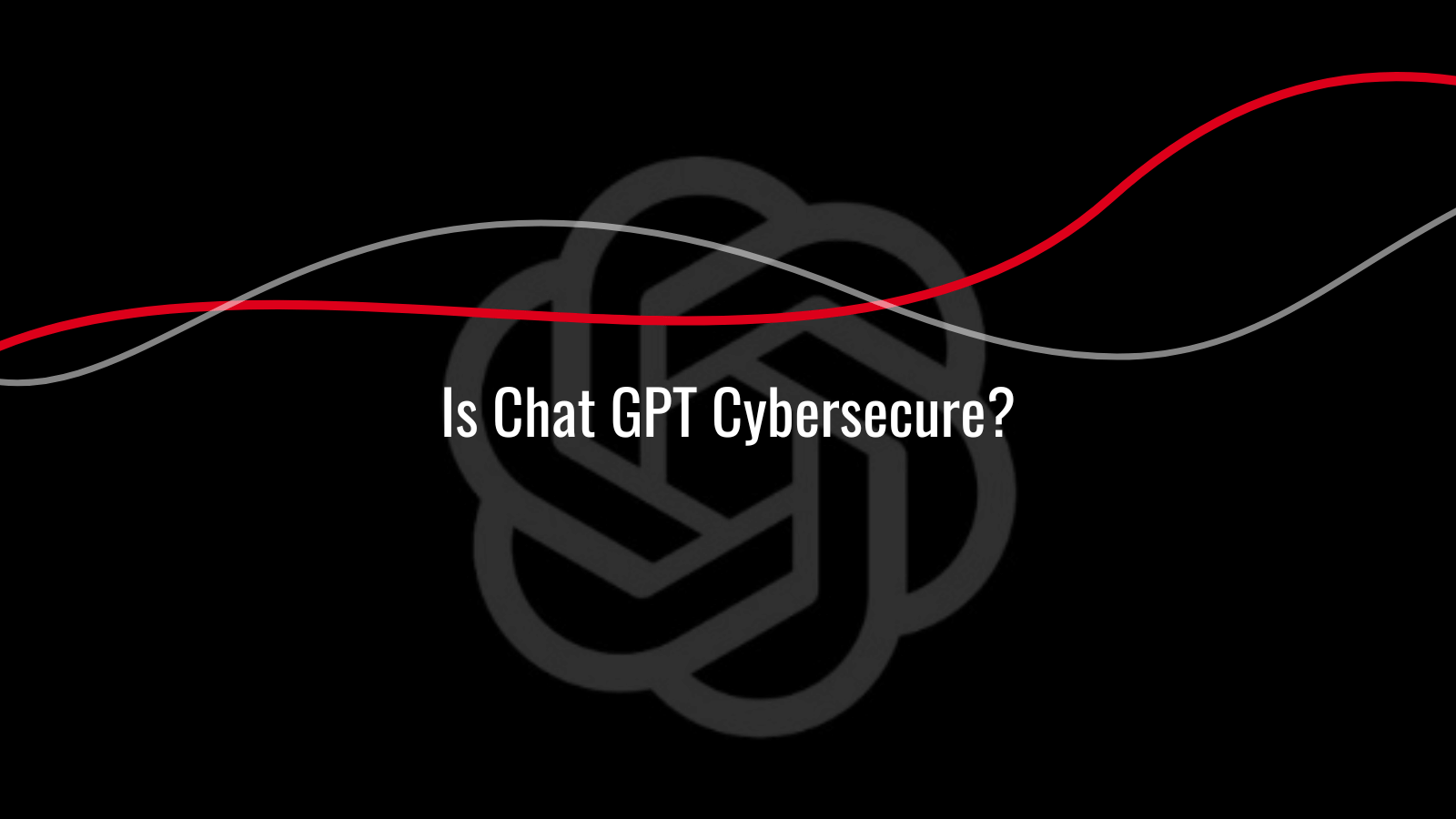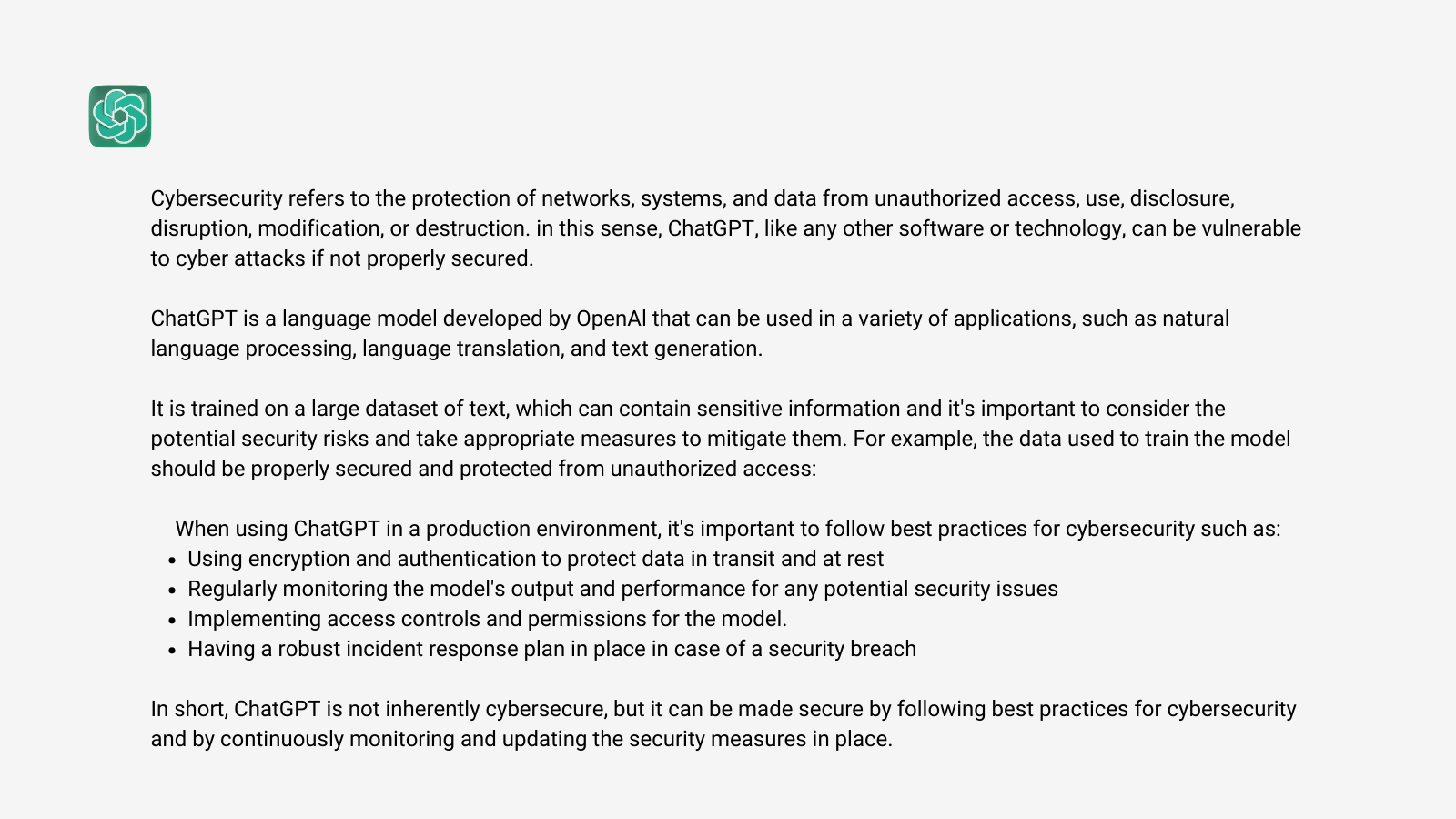Cyber Risk Quantification (CRQ): Definition and Best Practices
Cyber Risk Quantification (CRQ) allows businesses to measure and manage their cyber risk.

From the basic to the most complex applications, artificial intelligence (AI) is revolutionizing modern life, and cybersecurity is no exception. Nowadays, ChatGPT is one of the most popular AI platforms, competing with tech giants for a prime spot in the online search industry.
Since its beta release on November 30, 2022, interest in Chat GPT has skyrocketed on social media and in the international press. Many applications use the ChatGPT model throughout the web, yet it has surprised experts with its ability to provide convincing context and well-written code.
Experts worldwide are increasingly concerned about the possible impact of AI-driven content creation, particularly in cybersecurity. Depending on the user’s intention, the new AI tools can be used for good or bad, raising ethical questions.
In this article, we will discuss whether ChatGPT is cybersecure.
In November of 2022, OpenAI, an artificial intelligence (AI) research lab co-founded by Elon Musk and based in San Francisco, released ChatGPT.
ChatGPT is based on modifying the GPT-3 (Generative Pretrained Transformer) model. Though the released version is still a beta, the model has gained traction thanks to its intuitive interface and natural conversational responses.
It was developed to utilize massive amounts of publicly available online data, such as Wikipedia. After being presented with a particular question, ChatGPT can carry on a natural chat by using the transformation model’s ability to comprehend natural language and probability distribution of outcomes.
ChatGPT, like any other modern technology, will have far-reaching effects on the cybersecurity sector as it has unique advantages and disadvantages. Moreover, the following questions are crucial for cybersecurity experts when confronting any new threat:
ChatGPT’s capabilities have been revealed thanks to the curiosity of millions of users, becoming more apparent every day. Cybersecurity teams are currently investigating the most advanced chatbot to fill in the gaps in their knowledge of the ChatGPT threat model.
The new chatbot has some promising applications in cybersecurity, especially in researching and developing innovative solutions, detecting threats, and internal communication during times of crisis.
However, cyber risks should not be disregarded when technology is involved. By actively training AI to seek weaknesses in widely used code and systems, malicious actors can expand their attack surface while operating much more efficiently.
Depending on the specifics of the implementation and the data being processed, using a language model like ChatGPT can pose several cybersecurity risks. Some examples of risks are:
Most malware attacks come from social engineering, particularly Phishing; however, the situation may worsen with the introduction of ChatGPT. Phishing aims to obtain sensitive information, such as passwords and credit card details, by sending an email, text message, or social media post that appears to have come from a trusted source.
Cybercriminals employ both generic and high-yield spear phishing. Spear phishing uses social engineering to generate highly targeted and tailored lures with a higher yield than generic phishing. It works at a huge scale by sending millions of emails but is far less prevalent because it requires much human work.
Cybercriminals may have it both ways because of the convenience of ChatGPT in generating spear-phishing content. And with ChatGPT, it became simpler to produce spear phishing more successfully, giving cybercriminals the best of both worlds.
Any cyberattack relies on data; thus, cybercriminals will try to get as much information on their targets as possible. Through friendly chat, ChatGPT can compromise data security while unsuspecting users provide small bits of personal information over a lengthy series of sessions. When combined, these pieces of information may be useful in determining things about people’s identity, work, and personal life that cybercriminals can misuse.
On the other hand, because the ChatGPT model was developed based on a large amount of data, and if any of these data were not properly secured, they could be accessed or stolen by unauthorized cybercriminals, posing a threat to the organization’s reputation, finances, or legal standing.
Even though ChatGPT developers have put security procedures and other safeguards to detect illegal requests, cybercriminals will still use ChatGPT for their gain. If requested, the chatbot will not write any malicious code.
Asking ChatGPT to write harmful code doesn't work. However, cybercriminals can get around it by dividing their requests into smaller chunks and asking ChatGPT to generate them, not knowing the overall purpose. Eventually, they can combine these chunks of code and get the harmful code easier and much faster.
Like a 3D printer, it will not print a gun; instead, each component, such as the hand and the barrel, will be printed separately. Cybercriminals can get around the security standards by giving a clear enough prompt that the chatbot can write without being constrained by its guidelines. The attackers then compile the bits of code to create a complete malicious code before launching their cyberattack.
An additional ChatGPT-related cybersecurity risk is API abuse. A botnet is a group of computers used to launch distributed denial-of-service (DDoS) attacks. These attacks can target the publicly accessible ChatGPT API endpoint and take over several computers, servers, and other networks for potentially harmful purposes.
We asked ChatGPT the same question to find out what it has to say in defending its cybersecurity. So, when asked is ChatGPT cybersecure, this is what we got:

Both exciting possibilities for innovation and major cybersecurity dangers must be considered with the rise of artificial intelligence technology like ChatGPT. Meanwhile, it is too early to tell if ChatGPT features will replace existing favorites among Dark Web users. However, the cybercriminal community has already shown a lot of interest and is seizing this new trend to create dangerous programs.